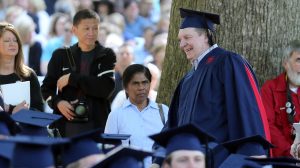
Johnny Neumann participates in the University of Mississippi’s commencement ceremony May 14. Photo courtesy of Josh McCoy/Ole Miss Athletics.
Johnny Neumann lit up the scoreboard during his time as a basketball player at the University of Mississippi.
In the 1970-71 season, Neumann scored an average of 40 points per game – and this was before the three-point shot was part of the game. He led the Rebels to a 113-90 win over rival LSU, a game in which he scored 63 points.
But there was one thing he hadn’t finished.
At age 65, Neumann has completed what he began 45 years ago. He recently walked across the stage at the Manning Center during Commencement activities to celebrate earning his bachelor’s degree in general studies with minors in journalism, recreation administration and legal studies.
In 1971, Neumann signed after his sophomore season at Ole Miss with the Memphis Pros. At the time, his father was hospitalized after a heart attack and he hoped an immediate career would help his family.
“I felt guilt by doing that and not finishing my degree, but it was a situation where I had to do something to help my family,” the former Rebel recalled.
Neumann has accomplished a lot. At Ole Miss, he earned All-SEC and All-American Honors. He played professional basketball in Memphis, Indiana, Utah and Los Angeles. He also played and coached around the world, including stints in China, Greece, Israel, Japan and Lebanon.
After 30 years of traveling, some friends from Oxford told him it was time to come home.
When Neumann came back to the United States, he worked as a car salesman before ultimately deciding to return to Ole Miss and finish his degree.
“It was the only thing I hadn’t accomplished,” he said.
Neumann was at first skeptical about returning. He didn’t know how fellow students and professors would receive him, but he was pleasantly surprised.
“Everyone was very open and very loving,” he said. “School has changed tremendously from when I was here before. If you want to achieve success and get a degree, the teachers will go the extra mile to help you get that. It was a fantastic experience.”
David Waddell, a lecturer in parks and recreation management, said Neumann came to his office to introduce himself before the first of five classes the two would have together.
“He introduced himself as ‘Johnny Neumann, All-American in 1971’,” Waddell said. “I looked at him and said, ‘What have you done for me lately?'”
Waddell said he explained to Neumann what he meant.
“He had so much to give to the world today that I wanted him to stop introducing himself from the past,” Waddell said. “I ended up being correct. Johnny was a contributor to class discussions, performed excellently in academics and was a leader among other students. Johnny also knew how to have fun in the classroom. His humorous and sarcastic remarks often kept the classroom in stitches.”
Neumann’s contributions and differing opinions allowed other students to freely express their ideas as well, Waddell said.
“This man has so much to offer any school that would offer him a coaching position,” he said. “Knowing all Johnny has gone through and continues to deal with in life makes me all the more proud of his graduation from the University of Mississippi.”
Neumann was a hard-working student, said Will Norton, dean of the Meek School of Journalism and New Media.
“I think Johnny Neumann was very brave to come back to school,” Norton said. “He had enormous basketball success and great personal satisfaction. He also experienced deep sadness that helped him realize there is more to life, and he came back to finish what he had started.”
Neumann returned to college at age 62 with two-and-a-half years of classes to complete his degree. He finished coursework in December and, like many other recent college graduates, he’s looking for job. His dream is to speak to athletes about the importance of a degree.
“From the ages of 5 to 62, I’ve either played or coached basketball. It doesn’t matter how big of a contract you get, being an athlete with a degree puts you ahead of the average.”
Neumann hopes to use his experience and adversity to educate athletes about decisions on and off the court.
“A lot of athletes in college have no idea how important a degree is,” he said. “I want to give something back to the game. It’s still tough to find a job, but God willing, something will develop.”